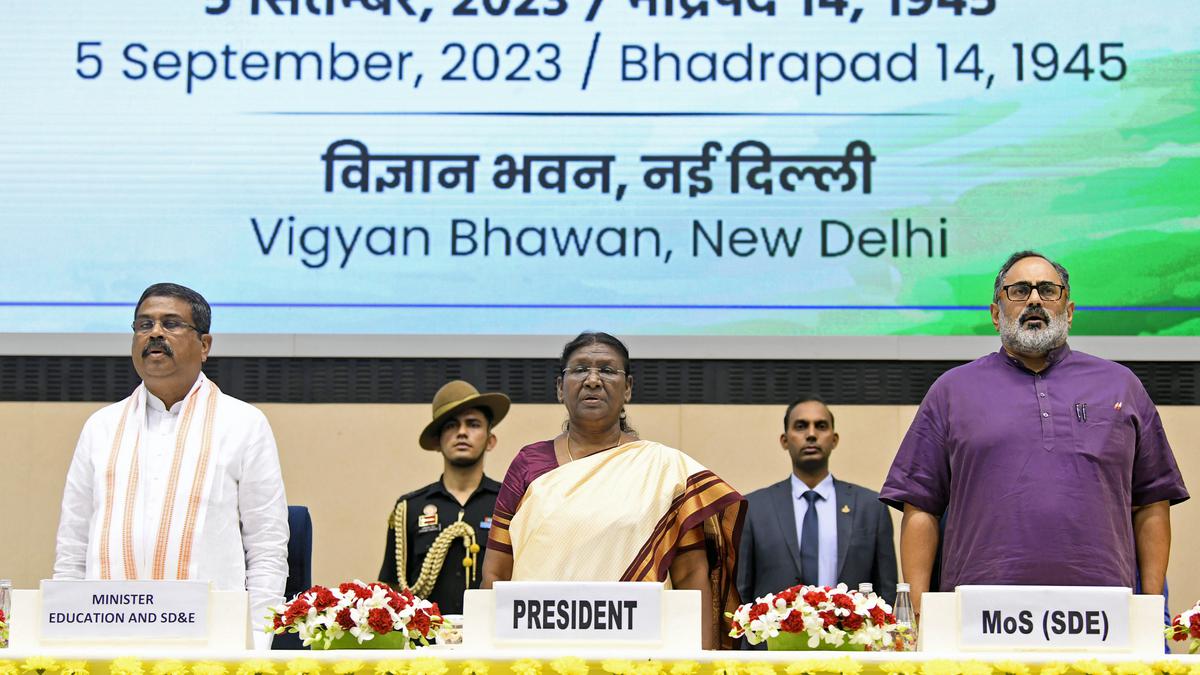
EMRS Bhopal Principal who turned school around is among National Teachers’ Award recipients
The Hindu
EMRS Bhopal Principal who turned school around is among National Teachers’ Award recipients.
Among the 50 school teachers who were awarded the National Teachers’ Award by President Droupadi Murmu on Tuesday was Yashpal Singh, Principal of the Eklavya Model Residential School, Bhopal. Dr. Singh ensured near full-capacity attendance from first generation school-going tribal children with simple approaches, including students’ have a say in deciding meals, and recreating what they liked about their forest homes at the residential school.
Dr. Singh, along with 74 other teachers from across the country, received the award from the President of India on September 5, and also met with Prime Minister Narendra Modi at his residence for tea. After being felicitated by Tribal Affairs Minister Arjun Munda on Wednesday, the 61-year-old Principal spoke to The Hindu on the school’s transformation.
“All I had to start with were chalks and dusters. Now, we have a world-class library, smart classrooms, and state-of-the-art labs,” he said, adding that when he took charge in 2018, just 61 students had taken admission, and the school had seen two Principals in two years.
EMRSs are residential schools for Scheduled Tribe (ST) children run as a Central scheme under the supervision of the National Education Society for Tribal Students. Each school has a capacity of 480 students from Classes 6 to 12.
“There are currently 465 students at EMRS Bhopal, but most of the time, it is at full capacity of 480,” Dr. Singh said, adding that he took help from the State and Union governments, the public, and students to make this happen. The school has recorded a zero-dropout rate in the last five years, and Dr. Singh said a large part of that came from involving the students in decision-making processes.
“We certainly improved the food quality but more importantly, I took meetings with the students and they would tell us what they wanted to eat in the mess for meals. We would accommodate dishes that they usually eat at home as well,” said Dr. Singh, who has a Ph.D. in Mathematics from Bhopal University.
The decision-making process originates with student representatives, above whom are teacher representatives, following which Dr. Singh reviews the arrangement and signs off on it.

“Writing, in general, is a very solitary process,” says Yauvanika Chopra, Associate Director at The New India Foundation (NIF), which, earlier this year, announced the 12th edition of its NIF Book Fellowships for research and scholarship about Indian history after Independence. While authors, in general, are built for it, it can still get very lonely, says Chopra, pointing out that the fellowship’s community support is as valuable as the monetary benefits it offers. “There is a solid community of NIF fellows, trustees, language experts, jury members, all of whom are incredibly competent,” she says. “They really help make authors feel supported from manuscript to publication, so you never feel like you’re struggling through isolation.”

Several principals of government and private schools in Delhi on Tuesday said the Directorate of Education (DoE) circular from a day earlier, directing schools to conduct classes in ‘hybrid’ mode, had caused confusion regarding day-to-day operations as they did not know how many students would return to school from Wednesday and how would teachers instruct in two modes — online and in person — at once. The DoE circular on Monday had also stated that the option to “exercise online mode of education, wherever available, shall vest with the students and their guardians”. Several schoolteachers also expressed confusion regarding the DoE order. A government schoolteacher said he was unsure of how to cope with the resumption of physical classes, given that the order directing government offices to ensure that 50% of the employees work from home is still in place. On Monday, the Commission for Air Quality Management in the National Capital Region and Adjoining Areas (CAQM) had, on the orders of the Supreme Court, directed schools in Delhi-NCR to shift classes to the hybrid mode, following which the DoE had issued the circular. The court had urged the Centre’s pollution watchdog to consider restarting physical classes due to many students missing out on the mid-day meals and lacking the necessary means to attend classes online. The CAQM had, on November 20, asked schools in Delhi-NCR to shift to the online mode of teaching.









